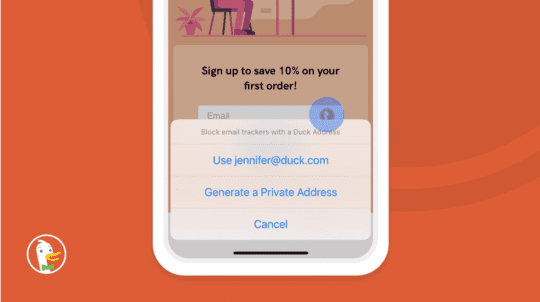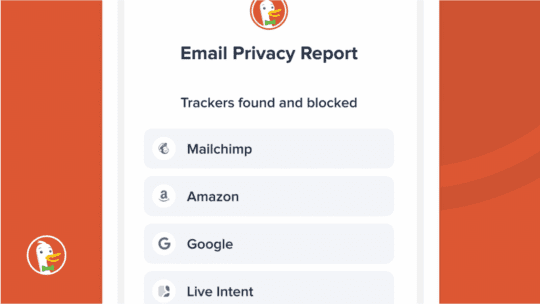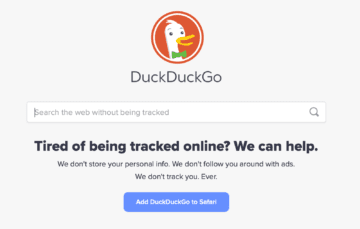In all honesty, I never gave much thought to how private my emails were. It was my email address that I was mostly worried about keeping private. Since WWDC21, though, I’ve learned about multiple email tracking techniques that I had no clue existed. Today, we’re going to be looking at DuckDuckGo’s email privacy service designed to help users avoid these email privacy risks.
For those that missed it, one of the things that Apple discussed at this year’s WWDC was privacy concerns related to your email.
One of the major talking points revolved around how invisible pixels in your emails can be used to track information like when you opened an email and where you were when you opened it.
I had no idea this was even a thing, but luckily, Apple and other tech organizations did. At WWDC21, Apple announced a few features coming to iOS 15 that will help prevent this kind of email tracking.
Shortly after that announcement, I got a notification from DuckDuckGo to beta test its new email privacy service, and it seems that the service aims to achieve the same thing as Apple’s.
So in this article, we’re going to be comparing the two services against each other. I’ll also be explaining what DuckDuckGo is, how its new email service works, and what Apple’s new email features are.
Let’s get started!
Contents
- What is DuckDuckGo?
- What are DuckDuckGo’s email privacy features?
- Apple had the same idea – how Hide My Email works in iCloud+
- How DuckDuckGo’s email privacy service compares to Apple’s Hide My Email
- Apple vs. DuckDuckGo’s email privacy features: It’s a draw
- The importance of making privacy convenient
- DuckDuckGo’s email privacy features are a great step forward for individuals
What is DuckDuckGo?
For those that don’t know, DuckDuckGo is a privacy-centric internet browser. Unlike Google, which monitors your internet searches and usage to serve you personalized ads, DuckDuckGo performs little to no tracking on you.
Instead, it relies on contextual advertising. That means DuckDuckGo shows you sponsored ads next to relevant searches – it doesn’t use your search history.
For example, if you search for “dog food” on DuckDuckGo, you’ll see ads for dog food right then on that search. But you won’t see those same ads later when you’re using YouTube or CoolMathGames, because DuckDuckGo isn’t storing and selling that information.
Google, on the other hand, will show you dog food ads right then, and you’ll notice that you see ads for dog food across the internet. This information is also used to influence the content you see online, which can lead to the spread of misinformation.
In addition to not storing your data, DuckDuckGo also keeps your searches anonymous. So nobody at DuckDuckGo will be able to see that you searched for dog food. The algorithm doesn’t track you at all.
You can make DuckDuckGo the default browser on any of your Apple devices by going to Settings, Safari, Search Engine, and choosing DuckDuckGo.
What are DuckDuckGo’s email privacy features?
DuckDuckGo’s email privacy service comes with a few key features to help you stay more secure and private online. But first, let’s explain how it works.
With this service, you can create a free email address using the “@duck.com” extension. You can then link that duck.com email to your preferred email address. For example, if you use an iCloud.com email address, you can connect that to your duck.com email.
Whenever someone sends an email to your duck.com email, it’ll be forwarded to your iCloud.com email. This means you can use your duck.com email to sign up for accounts, newsletters, and anything else that requires you to give your email away.
Hide your real email address behind a duck.com address
That’s the first way that this service protects you. It’s kind of like using a fake email address. Websites and apps will see your duck.com email instead of your real email address.

So if your duck.com email address is leaked in a hacking incident (which happens all the time!) you can just delete that duck.com address and then make a new one. Since your real email address was hidden behind the duck.com address, you won’t need to delete or change it.
Remove trackers from incoming emails before they hit your inbox
The second way that DuckDuckGo’s email privacy service protects you is by removing trackers. Emails that are sent to a duck.com email address are cleaned of any attached trackers before being sent to you. It happens in an instant, so you won’t see much of a delay in when your emails arrive.

When you open an email that was forwarded to you from your duck.com address, you’ll see a notification at the top of it from DuckDuckGo letting you know if trackers were removed, what kind of trackers they were, and how many were removed.
Use randomized duck.com email addresses to ensure total email privacy
Lastly, DuckDuckGo’s email privacy service will allow you to generate random emails that are attached to your duck.com email address. Like a randomly generated password that’s stored in Apple’s Keychain, you’ll be able to use random emails all across the web without needing to remember them.
These random email addresses will consist of a string of characters and numbers, like “dkaka8383SS@duck.com“. That random email address will forward to the duck.com email address you created, which will remove the trackers and forward the clean emails to your real email.
In other words, you get two layers of protection. Just like your regular duck.com address, you can delete these randomized addresses at any time. It’s a great way to stop receiving spam or to get rid of an email that has been leaked in a hacking incident.
These random addresses also have the benefit of letting you know who leaked your email. For instance, if you know that you used “dkaka8383SS@duck.com” with Abc123.com and no other website, and you start getting spam at that address, then you know that Abc123.com is leaking your data – unintentionally or otherwise.
Apple had the same idea – how Hide My Email works in iCloud+
Like I mentioned at the top of this article, DuckDuckGo’s email privacy service is similar to Apple’s upcoming features.
To be clear, I am not insinuating that either of these companies is knowingly copying the other. Both have been pioneering user privacy for the last several years, so it makes sense that they would come up with a similar product.
Plus, it takes months to develop tech like this, so it would be difficult for them to copy each other so quickly. It’s most likely a coincidence.
Anyway! Apple has introduced a few new features into its software and services that mirror DuckDuckGo’s.

First, Apple is adding a feature to iCloud for subscribers (now called “iCloud+” to match its other subscription services) called Hide My Email. This feature will let iCloud+ subscribers create a random iCloud.com email address whenever a website or app asks for their email. That random address will then forward back to your default iCloud email.
Sound familiar?
iCloud is also adding a feature to the Mail app that will remove trackers from your incoming emails before they arrive in your inbox. This one isn’t included in iCloud+ – all iOS users will get this for free in iOS 15.
How DuckDuckGo’s email privacy service compares to Apple’s Hide My Email
Alright, so it’s clear now that DuckDuckGo’s email privacy service and Apple’s upcoming changes to Mail and iCloud+ are, at least on the surface, very similar. To help you understand the key differences between them, I’ve put together this shortlist. That way, you can decide which service is right for you.
DuckDuckGo’s email privacy service is free
The first point of difference between these two services is the price. DuckDuckGo’s email privacy service is entirely free. You don’t have to pay anything for it – just set up your duck.com email and start replacing your old email address with the new one.
Apple’s Hide My Email service, on the other hand, is a feature of iCloud+. That means you’ll have to pay for iCloud+ to be able to use it.
That said, iCloud+ is by no means expensive. It’s just a rebranding of the already existing iCloud subscription options – the prices aren’t going to change at all.
Right now, those prices look like this:
- $0.99/month for 50GB of storage
- $2.99/month for 200GB of storage
- $9.99/month for 2TB of storage
You can check those prices by clicking this link, just in case they change over time. It doesn’t matter which plan you sign up for, they will all include Hide My Email once Apple updates iCloud later this year.
In other words, you could get access to this email protection feature for free from DuckDuckGo, or $0.99/month from Apple. Not a big difference in my opinion!
Hide My Email is bundled with iCloud+, so you get extra features
Something you may have noticed in the last point is that you don’t just get the Hide My Email feature for $0.99/month. You also get 50GB of storage. You can use that storage for backing up your iOS and iPadOS devices as well as storing files from all of your Apple devices.
I use iCloud to store all of my work files. That way, I can access my work from any device and at any location. Plus, it serves as a great backup option. If I dropped my MacBook in a lake, I’d still have access to everything I’ve written over the last three years.
Not only is Apple adding Hide My Email to iCloud+, but the subscription service is also going to be getting:
- Private Relay: This is essentially a built-in VPN. It’ll hide all of your internet traffic from your ISP as well as Apple.
- HomeKit Secure Video: If you have a HomeKit-connected security camera at home, this feature will allow you to store as much security footage as you want. It’s unlimited and doesn’t count towards the rest of your iCloud storage. So you could store 5TB of security footage and still have the 50GB of storage you paid for.
So even though DuckDuckGo’s email privacy service is free, the little bit extra you get with iCloud+ makes it a solid deal. If you aren’t going to use those extra iCloud+ features, though, then I wouldn’t let the extra features entice you too much.
Another point to consider is that iOS 15 will block hidden pixels (a.k.a. email trackers) by default. If you use Apple Mail or iCloud to manage your emails, then you won’t have to worry about email trackers, to begin with.
This doesn’t completely make DuckDuckGo’s email privacy service completely moot. The tracking removal feature is just one of the reasons DuckDuckGo’s service is great. But if that’s your main reason for using it, you might reconsider.
At least, you might reconsider if you already use Apple Mail or iCloud email. If you prefer to use another email client, like Gmail, then you’ll want to use DuckDuckGo’s service instead of, or in addition to, iCloud+.
DuckDuckGo’s email privacy features are platform-agnostic
That brings us to the next point, which is that DuckDuckGo’s email privacy features are platform-agnostic. Put another way, it doesn’t matter which devices or apps you use. You’ll still be able to use DuckDuckGo’s free email service.
Apple’s features and services, on the other hand, are locked into the Apple ecosystem. You can only use them if you use iCloud+, an iOS/iPadOS/macOS device, and/or an iCloud email. And even if you do use those devices, you’ll have to use Apple’s Mail app to be able to use these features.
If you prefer to mix and match devices and apps or just don’t want to use anything by Apple, then DuckDuckGo is the way to go. It won’t lock you into anything because (at least for now) DuckDuckGo doesn’t make any products that are specific to any platform.
Both Apple and DuckDuckGo are (mostly) reliable privacy advocates
Lastly, it’s important to note that both Apple and DuckDuckGo are reliable privacy advocates. Each has put its money where its mouth is and has withstood a fair amount of scrutiny.
Of course, neither is a perfect privacy solution. Apple has recently had a privacy controversy over its decision to scan users’ photos to help stop child abuse. And DuckDuckGo does collect some data on you, but it’s minimal enough to be negligible to the vast majority of users.
In my opinion, there isn’t a whole of competition when it comes to mainstream privacy. Apple and DuckDuckGo have no one else to compete with but each other. There are more private options out there, such as using a TOR browser and more hardcore privacy search engines.
At that point, though, you start to enter “privacy nut” territory. Not that there’s anything wrong with being a privacy nut – it just isn’t practical for the average user.
So I wouldn’t let the words of hardcore privacy users sway you from trusting Apple and DuckDuckGo’s services – they are 95% options without any of the complexity that a 100% solution will come with.
Apple vs. DuckDuckGo’s email privacy features: It’s a draw
And that brings us to the most important point of this article, which is somewhat of a boring conclusion, I’ll admit:
These services are more or less the same. Apple or DuckDuckGo, the difference will be minimal.
That’s not because these are bad options. Actually, it’s because they’re both so solid and simple that it’s difficult to pick a winner.
If you want a free and platform-agnostic option, then go with DuckDuckGo. If you’re locked into the Apple ecosystem like me, then Apple’s options will probably appeal to you more. The price is pretty negligible and the extra features are really useful. I will be using all of them once they’re released.
The importance of making privacy convenient
Before closing out this article, I did want to make a point of mentioning the importance of making privacy convenient. This is something that both Apple and DuckDuckGo have been excellent at, and it’s why I have no issue recommending them to our AppleToolBox readers.
They may not be perfect, but they’re miles ahead of the competition. And they’re so easy to use that anyone can reduce their digital footprint by using them.

I touched on this before, but I want to hammer the point home. Digital privacy must become as convenient as everything else on our devices. Education is important, but the truth is that most people don’t have the motivation or time to invest in securing themselves.
That does not mean, though, that most people don’t deserve to have their privacy respected. Online privacy should be a right in my opinion, and it should be enforced at the federal level.
Hopefully, we see lawmakers put protective laws in place for consumers over time. That way, services like DuckDuckGo’s email privacy features and iCloud+ won’t be necessary. People will have peace of mind that they’re safe, just like they have peace of mind that they aren’t buying rotten food from the grocer.
DuckDuckGo’s email privacy features are a great step forward for individuals
And that’s it! That’s everything I have to say on DuckDuckGo’s email privacy service and the upcoming iCloud+ and iOS 15 features. I hope I made it easier for you to decide which is right for you. You could always use a combination of both, of course, which will add even more protection to your accounts.
I’d also recommend switching to the DuckDuckGo search engine over Google. The results are sometimes not as good, but you can just type “!g” to the beginning/end of a DuckDuckGo search to turn your search into a Google search.
For instance, if you search for “dog food” on DuckDuckGo and can’t find what you’re looking for, change your search to “dog food !g” and DuckDuckGo will pull up the same search in Google.
You can also read this post on reducing your digital footprint. I put a lot of great and easy tips in here, so check it out!
For more reviews, comparisons, and all things Apple, check out the rest of the AppleToolBox blog.
See you next time!










Sorry I sent it before double checking it: I emailed somebody, and a couple hours later I went back to see if they had answered me, when I found the email address had their email and then an _ with my email attached. So did they some how get in to see who actually sent the email this way? Or how did the email end up like that?
It was not their email and then my email; When I originally sent it only his name showed up in as sender. But when i went back in to check if he had answered me the sent email shows it as noticed above. Whatever that is just sneaky business. I am hiding mine to keep trackers off me and to not get tons of emails if I don’t choose to go with a company or buy their product.
Thank you,
I emailed somebody, and a couple hours later I went back to see if they had answered me when I found the email had their email and then an _ to my email shown above on here. So did they some how get in to see who actually sent the email this way? Or how did the email end up like that?
It was not their email and then , and my email; It was his email then . But only his name showed up before I sent reply. But checking the sent email shows it as noticed above. Whatever that is just sneaky business. I am hiding mine to keep trackers off me and to not get tons of emails if I don’t choose to go with a company or buy their product.
Any help with this matter would be appreciated.
Thank you
Will this email work on Chromebook or Kindle fire? Thank you for your time.
Abine’s Blur has a masked email feature. You can actually create the email (e.g. myname_apple@…)